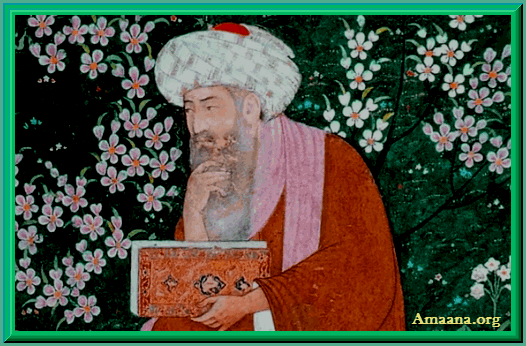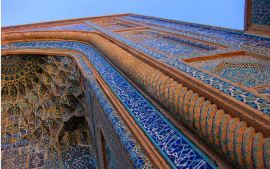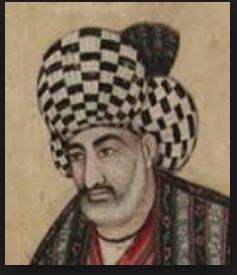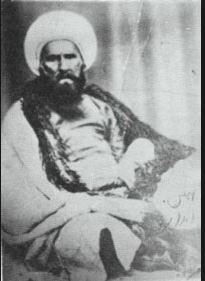
IMAMI SHI`I AND RELATED ANNOTATED BIBLIOGRAPHIES PERTAINING TO SUFISM AND ISLAMIC MYSTICISM,
Stephen Lambden
IN PROGRESS - last updated 15-10-2020,
IMAMI SHI`I ISLAM - SELECT SHI`I BIBLIOGRAPHIES, NOTES AND STUDIES
- Imami Shī`ī Islam, General Bibliography
- Shi`i Hadith/ Akhbar Compilations - Bio-bibliographical Notes and Studies.
- The Twelver Imams from `Alī (d. 40/661) until al-Hujjat, Muhammad al-Mahdī (d. c. 260/873-4).
- Shi`i Imamology.
- Nubuwwa (Prophethood) and Nabi (Prophet), Wilāya ("Divine Providence") and Walī (Intimate),
- Beyond Khatamiyya (Sealedness) through Shī`ī Imamology, Messianism and Theophanology.
- Proto-Shi`ism and the Ghulāt factions.
- Zaydism & Ismā'īlism
- The Rasā'il Ikhwān al-Ṣafā'.
- Shi`i and Babi-Baha'i Imamology: Some introductory Notes on the Twelver Imams and traditions attributed to them in Shi`i and Babi-Baha'i scriptural sources.
Rijal mss, Books and Sources.
Twelver Shi`i Scholars and other Influential notables.
- Sulaym ibn Qays al-Hilālī (d. c. 705 CE)
- Ṣaffār al-Qummī = Abu Ja`far Muhammad ibn al-Ḥasan ibn Farrukh al-'Ash'ari al-Qummi (d. 290/903).
- Abu Ja`far Muhammad ibn Ya`qub al-Kulaynī (d. c. 328/929).
- Ibn Bābawayh [Bābūya], Abū Ja`far Muhammad. b. `Alī, al Qummī = al‑Ṣādūq (d. 381/991-2)
- Shaykh al-Mufid = Abu 'Abd Allah Muhammad ibn Muhammad ibn al-Nu'mani al-'Ukbari al-Baghdadi = Shaykh al-Mu`allim (d. 413/1022).
- Sayyid Husayn ibn Hasan al-Karaki (d. 992-93/1001).
- Sayyid al-Ḥusayn ibn `Ali al-Karaki (b. Jabal Amil c. 865/1451-d. Najaf 940/1534).
- Abu Ja`far Muhammad ibn Ḥasan al Tūsī (d. 460/1067).
- Ibn Shahrāshūb, ابن شهراشوب , Muhammad ibn `Alī, Abū Ja`far (d. 588/1192).
SELECT EARLY SUFIS AND THEIR WRITINGS.
- al-Ḥallaj : al-Ḥusayn ibn Manṣūr / Abū Manṣūr al-Ḥallāj (executed. 309 /922).
- al-Tirmidhī, Muhammad ibn ʻAlī, al-Ḥakīm (d. 320/932),

Mausoleum of the Shaykh al-Ishrāq...
SUHRAWARDI AND SELECT INFLUENTIAL ISHRAQI THINKERS.
- Shihāb al-Dīn Yaḥyā Suhrawardī (549-587 AH = 1154-1191CE): Annotated Bibliography. 2015.
- Shihāb al-Dīn Yaḥyā Suhrawardī (549-587 AH = 1154-1191CE): Bibliography, Secondary Sources 2015.
- Stanford Encyclopedia of Philosophy -Suhrawardi.
`ALI IBN AHMAD, MUHYI AL-DIN, AL-BUNI, AND ASSOCIATED OCCULT THINKERS ABD THEOLOGIANS
IBN AL-`ARABI AND SELECT DEVOTEES OF INFLUENCE AND OPPONENTS WITHIN THE SHI`I WORLD,

-
Muhammad, Muḥyi al-Dīn Ibn al-`Arabī (b. Murcia [Spain] 560/1165 - d. Damascus [Syria] 638/1240).
-
Maḥmūd ibn ʻAbd al-Karīm Shabistarī (b. Shahbistar [near Tabriz] c. 686/1287 - d. c. 720/1320).
-
Ahmad ibn Muhammad ibn Ahmad Biyabanak, `Alā al-Dawlah Simnānī (d. 787/1385).
- Sayyid Ḥaydar al-Āmulī (b. Āmul 719–787 / 1319–1385).
This learned twelver Shī`ī scholar and mystic was much influenced by Ibn al`Arabī upon whose seminal Fuṣūṣ al-ḥikam (The Bezels of Wisdom) he wrote a commentary entitled Naṣṣ al-nuṣūṣ (The Text of Texts).
- al-Jīlī, `Abd al-Karīm ibn Ibrāhīm ( d. c. 832/1428).
- al-Lahījī, Muhammad ibn Yaḥyā (d. Shiraz 912/1505).
TWELVER SHI`I NOTABLES, 13TH CENT CE., ONWARDS.
- Raḍī al-Dīn Ibn Tāwūs (d. 664/1226 ), Raḍī al-Dīn 'Alī ibn. Mūsā ibn Ṭāwūs al-Hasanī al-Ḥillī,
- Muhammad ibn Ḥasan Khwājah Naṣīr al-Dīn Ṭūsī (d. Baghdad 672 /1274)
- Abu Manṣūr al-Ḥasan ibn Yūsuf ... `Allāma al-Ḥillī (648-726 = 1250-1325).
- Ibn Abī Jumhūr al-Aḥsā'ī, ابن أبي جمهور الاحسائي (d. after 878/ 1479) = Muhammad Ibn Zayn al-Din ibn Ibrahim al-Aḥsā'ī.
- al-Karaki = Nur-al-Din Abu’l-Ḥasan ʿAli b. Ḥosayn b. ʿAbd-al-ʿĀli, = Moḥaqqeq al-Thāni or Moḥaqqeq ʿAli (1464-1533).
- al-Kaf`amī al-`Āmilī, Shaykh Taqī al-Dīn ( d. 900/1494-5).
THE SAFAVID ERA AND BEYOND - CLERICS, PHILOSOPHERS AND THEOLOGIANS (1501-1722?),
- Zayn al-Din ibn `Ali ibn Ahmad, Shahīd al-Thānī, al-Jubba`i al-`Amili al-Shami (911-966 = 1506-1559).
- Shams al-Din Muhammad ibn Makki al-`Āmilī (d. 984/1576) = al-Shahīd al-Awwal (The First Martyr).
- Shaykh Husayn ibn `Abd al-Samad al-Ḥārithī al-`Āmilī (d. 984/1576)
- Zayn al-Din ibn `Ali ibn Ahmad al-Jubba'i al-`Āmilī (d. 984/1576) = al-Shahīd al-Thānī (The Second Martyr).
- Muhammad Bāqir Astarābadī, Mīr Dāmād, Ishrāq, the "Third Master" (d.1041/1641).

بهاء الدين محمد بن حسين عاملي
Bahā' al-Dīn al-`Āmilī, Shaykh Bahā'ī, (d. Isfahan 1031/1622).
- Old UK Incomplete, uncorreced site, 2009-10 : Hurqalya I PDf. Shaykh Bahai-WI.pdf
- Bahāʾ al-Dīn Muhammad al-`Āmilī (953-1030 = 1547-1621 CE) = Shaykh Bahā'ī : Select Primary Sources, mss. and Printed Texts. Under revision and updating - 2015.
- `Āmilī, Shaykh Bahā'ī : Bibliography of Secondary Sources. Being updated 2015.
در رموز اسم اعظم
- Lambden, trans. from Persian : Dar rumuz-i ism-i a`zam ("On the secrets of the Mightiest Name of God") of Bahā' al-Din al-Amili (d. Isfahan 1031/1622). rumuz.pdf

ملا صدرا
- Ṣadr al-Dīn Shirazi = Mullā Ṣadrā (d.1050/1640). Uncorrected UK Website.
- Ṣadr al-Dīn Shirazi = Mullā Ṣadrā (d.1050/1640). Primary Sources, UC Merced 2015.
- Ṣadr al-Dīn Shirazi = Mullā Ṣadrā (d.1050/1640). Secondary Sources, 2015.
- Sayyid Aḥmad b. Zayn al-Ābidīn al-Alawī (d. c. 1050/1650).
- al-Fayḍ al-Kāshī / al-Kāshānī, Muhammad ibn Murtaḍá (d. 1090/1680),
- al-Ḥurr al-`Āmilī = Muhammad ibn al-Ḥasan al-Ḥurr al-`Āmilī (d. 1104 / 1693).

TOWARDS THE QAJAR ERA AND BEYOND (1794-1925),
- Yūsuf al-Baḥrānī = Yūsuf ibn Aḥmad ibn Ibrahim Dirāzī (d. 1186/1772).
- Aqa Muhammad Baqir Bibihani, Vahid Bihbihani ( d. c. 1207/1792).
- Sayyid Muhammad Mahdī Tabataba'i, Baḥr al-`ulūm ("The Ocean of the Islamic Sciences"), (d. 1212 /1797);
- Kashfi, Ja`far ibn Abi Ishaq (c. XXX/1775 - d.126X/1850-1).

- Ḥājj Mullā Hādī Sabzavārī (1797-1873) - ملا هادی سبزواری
![]()
ولاية
Dimensions of Walāya in Shi`i-Shaykhi and Babi-Baha'i literatures
![]()
...اللَّهُمَّ إِنِّي أَسْأَلُكَ مِنْ بَهَائِكَ بِأَبْهَاهُ وَكُلُّ بَهَائِكَ بَهِيٌّ، اللَّهُمَّ إِنِّي أَسْأَلُكَ بِبَهَائِكَ كُلِّهِ
- The Du`ā al-Bahā' or Saḥar, the Ramadan Dawn Prayer of Imam Muhammad al-Bāqir.
- PDf. from `Abbas al-Qumi (ed.), Mafatih al-Jinan (Keys to the Paradises), 1427/2006. Du`a al-Baha.pdf
![]()
دُعاء يوم المباهلة
- The Du`ā yawm al-mubāhala ("Supplication for the Day of Mutual Execration") of Imam Muhammad al-Bāqir (d.c. 126/743).
- PDf. from `Abbas al-Qummi ed. Mafatih al-Jinan (Keys to the Paradises), 1427/2006. Yawm Mubahala.pdf
![]()
دعاء أمّ داود
- The Du`ā Umm Dawud ("The Supplication of the Mother of David");
- PDf. from `Abbas al-Qummi. ed. Mafatih al-Jinan (Keys to the Paradises). PDf. Umm Dawud-y.pdf
![]()

The Ḥadīth al-Ḥaqīqa (Tradition Regarding Ultimate Reality) ascribed to Imam `Ali ibn Abi Talib (d. 40/661).
- Tafsīr Ḥadith al-Ḥaqiqa I: Introduction, the Shi`i Origins and Commentaries.
- Texts and Translations of the Ḥadīth al-Ḥaqīqa.
- Tafsīr Ḥadith al-Ḥaqiqa II : Shaykh Aḥmad al-Ahsāī and Early Shaykhism.
- Shaykh Aḥmad al-Aḥsā’ī on an Islamic form of the Delphic Maxim - Introduction
- Shaykh Aḥmad al-Aḥsā’ī on an Islamic form of the Delphic Maxim with extensive Commentary on the Hadith al-haqiqa - Annotated Translation.
- Tafsīr Ḥadīth al-Ḥaqīqa, III : The Commentary of the Bāb upon the Ḥadīth al-Haqiqa
- The Ḥadīth al-Ḥaqīqa (Tradition Regarding Ultimate Reality) IV : In the writings of the Bab, early Babis and the writings of Baha'-Allah and his successors.
![]()
دعاء السمات
- The Du`a al-simat, Some introductory Notes,
- PDf. from `Abbas al-Qumi. ed. Mafatih al-Jinan (Keys to the Paradises). Du`a al-simat.pdf
- An annotated Translation of the Du`a al-Simat
- Further Notes on the Du`a al-simat
- Biblical echoes of the Shī`i Du`a al-simāt (Prayer of the Signs).
- The Commentary of Sayyid Kāẓim al-Ḥusaynī al-Rashtī (d.1259/1843).
![]()
خطبة الطتنجية
The Khutbat al-Tutunjiyya [Tatanjiyya] "Sermon of the Gulf" ascribed to `Ali ibn Abi Talib (d. 40/661), its Translation and Studies in its Shaykhi and Babi-Baha'i Interpretations.
- An Introduction to the Khuṭbat al-ṭutunjiyya [taṭanjiyya].
- Mss and printed versions of the Khuṭbat al-ṭutunjiyya [taṭanjiyya].
- The Khuṭbat al-ṭutunjiyya [taṭanjiyya] ("Sermon of the Gulf") ascribed to Imam `Ali ibn Abi Talib (d. 40/661). Text and translation Stephen N. Lambden.
- The Khuṭbat al-Ṭutunjiyya in the writings of Shaykh Aḥmad al-Aḥsā'ī (d. 1241/1826), Sayyid Kazim al-Husayni al-Rashti (d.1259/1843) and other Shaykhi leaders.
- The al-Khuṭba al-Ṭutunjiyya of Imam `Ali and the Commentary of Sayyid Kazim Rashti.
- The Khuṭbat al-Ṭutunjiyya in the writings of Sayyid `Ali Muhamnmad Shirazi, the Bab (1817-1850).
- The Tafsīr of the Bāb on a passage in the Sharḥ Khuṭbat al-Ṭutunjiyya of Sayyid Kāẓim Rashtī (d.1259/1843).
- Sharḥ al-Khuṭba al-Ṭutunjiyya of the Bab - Introduction.
- Sharḥ al-Khuṭba al-Ṭutunjiyya of the Bab - Translation
in the Writings of Baha'-Allah (1817-1892).Khuṭbat al-ṭutunjiyya The - Further Notes on the Babi and Baha’i Interpretation of the Khuṭbat al-Ṭutunjiyya ("Sermon of the Gulf").
![]()



